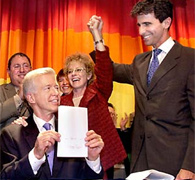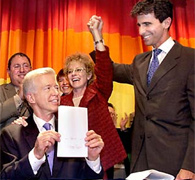California governor, Gray Davis, has signed a groundbreaking new domestic-partnership bill that accords gay and lesbian couples most of the state-level rights and protections that married couples enjoy, just short of changing California's marriage laws that prohibit same-sex couples from getting married.

Gov. Gray Davis displays AB205 at the bill signing in San Francisco, with former Assemblywoman Carole Migden (raising hands) and Assemblyman Mark Leno (right).
The bill provides a new range of rights and responsibilities to gay and lesbian partnerships with legal access to family court, community property settlements, alimony, child support requirements, the right not to testify against the other in court as well as death benefits for surviving partners of police and fire-fighters.
The law also places greater legal responsibilities on domestic partners. For instance, people registered as domestic partners can be covered under each other's heath and car insurance plan, make funeral arrangements for a deceased partner, take extended leave from work to care for a partner as well as share mutual responsibility for debts.
This bill; which was signed at a special ceremony Friday evening at the San Francisco Lesbian, Gay, Bisexual, and Transgender Community Center; will however not give gay and lesbian couples the nearly 1,000 federal protections that go along with civil marriage.
The provisions will only take effect from January 1, 2005 to give the state's currently registered domestic partners enough time to consider the responsibilities that come with it - and lawmakers enough time to educate them.
Jennifer Pizer, a senior staff attorney in the Western regional office of Lambda Legal Defense and Education Fund, which played a key role in drafting the legislation said: "This is a complicated law that people need to know more about, and starting today we're providing information so that couples all across the state can make decisions over the next 15 months that will make this law a reality in their lives."
"We got involved in drafting this bill because so many of the clients we represent in court could have avoided terrible legal ordeals if protections like this were already in place. This law obviously won't solve everything, but it's a huge step forward."
California governor, Gray Davis, has signed a groundbreaking new domestic-partnership bill that accords gay and lesbian couples most of the state-level rights and protections that married couples enjoy, just short of changing California's marriage laws that prohibit same-sex couples from getting married.

Gov. Gray Davis displays AB205 at the bill signing in San Francisco, with former Assemblywoman Carole Migden (raising hands) and Assemblyman Mark Leno (right).
The bill provides a new range of rights and responsibilities to gay and lesbian partnerships with legal access to family court, community property settlements, alimony, child support requirements, the right not to testify against the other in court as well as death benefits for surviving partners of police and fire-fighters.
The law also places greater legal responsibilities on domestic partners. For instance, people registered as domestic partners can be covered under each other's heath and car insurance plan, make funeral arrangements for a deceased partner, take extended leave from work to care for a partner as well as share mutual responsibility for debts.
This bill; which was signed at a special ceremony Friday evening at the San Francisco Lesbian, Gay, Bisexual, and Transgender Community Center; will however not give gay and lesbian couples the nearly 1,000 federal protections that go along with civil marriage.
The provisions will only take effect from January 1, 2005 to give the state's currently registered domestic partners enough time to consider the responsibilities that come with it - and lawmakers enough time to educate them.
Jennifer Pizer, a senior staff attorney in the Western regional office of Lambda Legal Defense and Education Fund, which played a key role in drafting the legislation said: "This is a complicated law that people need to know more about, and starting today we're providing information so that couples all across the state can make decisions over the next 15 months that will make this law a reality in their lives."
"We got involved in drafting this bill because so many of the clients we represent in court could have avoided terrible legal ordeals if protections like this were already in place. This law obviously won't solve everything, but it's a huge step forward."
